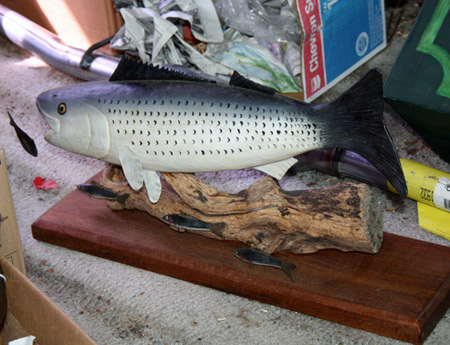
The worms crawl in, the worms crawl out. And in between, they eat organic waste and excrete black gold for gardeners.
“Red worms have the ability to eliminate pathogens and carcinogens in the soil, offers WormPoop.com, a website that propounds the use of worms, their castings—or excretions—and “worm tea," which is really, really, really not for drinking but rather a brew made from castings that can stimulate helpful microbiological activity in soil.
"The minerals and nutrients provided by the worm castings allow the plant roots to grow stronger and become more drought-tolerant,” explains WormPoop.com.
People in the know are keeping a bin full of red wigglers under the kitchen sink to eat detritus that would normally go into the garbage or down the disposal. Nick Sarin of Manorville started off with a bin in the basement, but now he has a 55-gallon barrel of worms kept outside, and he’s thinking about adding a second.
“I started off with a pound of worms,” he said—1 pound equals about a thousand. “I just feed them kitchen scraps.” The soil castings gather at the bottom of the barrel and “it’s nice stuff,” he said. “But I may run it through a second time.”
With the exception of meat, dairy and citrus, worms can plow through just about anything. And like the average teenager, all they need is food, water, oxygen, and a dark place to live.
Mica Marder of Springs provides all the simple ingredients for his plethora of earthworms in an ambitious vermicomposting project at the expansive Marder family enclave off Springs-Fireplace Road. Because he gathers organic waste materials from local businesses, Mr. Marder’s worms never run out of good stuff to chow down on in the family’s vegetable gardens.
“We’ve been trying to grow the best, healthiest vegetables and plants for our own personal use,” said Mr. Marder on a beautiful spring day as he offered a tour of the family farm, replete with chicks and ducks and geese, and a handful of rust-colored piglets playing in the sun with their mother.
There is also an enclosed area of more than a dozen raised beds filled with rich soil for the coming season. “Healthy soil raises the plants’ immune systems, and it’s passed on to us,” Mr. Marder explained.
For those who have never spent a day down in the dirt, this is how it works: Worms are basically invertebrate pistons that steadily work their way through decaying matter—whether it is leaves and dead plants in the wild, or coffee grounds and kitchen waste served to them—and leave behind a nutrient-rich compost that is valuable to farmers and gardeners.
Mr. Marder started out with 15 pounds of tiger worms, or red wigglers—which can be ordered online at sites like nyworms.com—along with a number of native earthworms as well. During the winter he picked up organic waste destined for the dump from local shops.
“Jack’s Coffee, the Montauk Juice Factory, Provisions, Hampton Coffee, the Golden Pear …,” Mr. Marder paused. “I hope I’m not forgetting anyone. It was very helpful.”
Organic coffee grounds, rotting produce, egg and clam shells, “they eat just about anything,” he said of his wriggly little food processors. They should not fed any abrasive substances—or citrus, which is too acidic.
"And we keep out any meat or dairy; they don’t like it anyway, and when it decomposes it smells bad,” Mr. Marder noted.
Because the worms keep reproducing, there is no way to keep track of how many there are, but they continue to live and thrive in two large, dumpster-like containers as well as in the raised beds themselves.
Mr. Marder hopped in one container and with a shovel gently turned over the decomposing matter to show scores of squirming bodies. “There are baby worms and eggs in there too,” he said gently. “That’s a very good sign that things are going well, when they’re reproducing."
He explained that he takes samples from different areas as he examined a shovelful where everything was looking good. Raising worms has upped his respect for the legless wonders, he said, noting that they are also fascinating to watch.
“What they’re doing for the earth, it's amazing” Mr. Marder said. “We’re really creating a super soil here. And this is where it starts.”
"